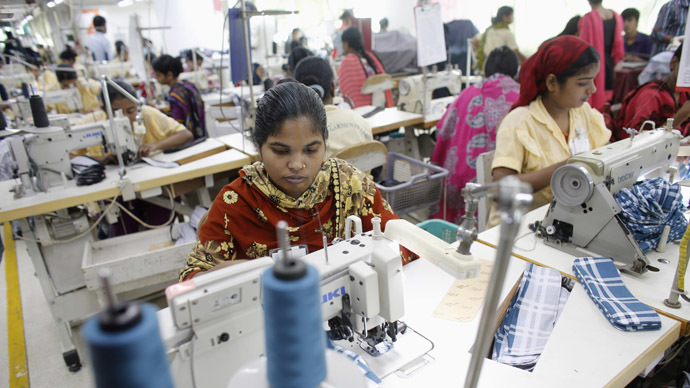‘Human cost of cheap clothes’: Retail giants fail to pay Rana Plaza victims compensation

Roughly twelve clothing firms linked to Bangladesh’s Rana Plaza factory, which collapsed two years ago killing over 1,100 people, are yet to offer a single penny into a fund for the families of victims who lost their lives in the disaster.
As the second anniversary of the tragedy draws ever closer, pressure is mounting on the predominantly European and American firms to pay their dues.
The eight-story building in Dhaka, home to several clothing factories, collapsed in May 2013. In what has been described as one of the worst industrial disasters in modern history, 1,138 people lost their lives and 2,000 were injured.
READ MORE: Top politicians wore feminist T-shirts made by women making less than $1 an hour
The Donors Trust Fund, supported by the United Nation’s International Labor Organization (ILO), was founded specifically to compensate victims of the catastrophe.
Sums offered to people will be dependent on circumstances, such as the number of children they have and the salaries earned by those who lost their lives.
Campaigners, who have battled for justice for those impacted by the disaster for almost two years, hoped a total of $30 million could be raised for families of the victims.
However, at present the fund consists of just $23 million. The shortfall means as many as 5,000 individuals entitled to compensation will only receive 70 percent of what they were hoping for.
Ineke Zeldenrust, of UK social justice group The Clean Clothes Campaign, said the victims of the Rana Plaza disaster have had their fill of “broken promises” and “false sympathy” from these brands.
She called it an outrage that campaigners have been unable to secure a mere $30 million from a group of companies that collectively turn over tens of billions of dollars in profit each year.
Zeldenrust stressed the victims would like their compensation to be settled so they can continue with their lives.
The human cost of cheap apparel
The clothing industry is a highly competitive, labor-intensive and profit-driven sector. Throughout the 1950s and 1960s, Western producers chased cheaper labor in Japan. In the twenty years that followed, Western factory owners began to source cut-price labor in the so-called Asian Tiger economies of Singapore, South Korea, Taiwan and Hong Kong.
In recent decades, garment manufacturing in the West has plummeted. Meanwhile, production in China, Indonesia, Bangladesh, Turkey, Mexico and India has increased dramatically.
This shift in production has led to the rise of sweatshop labor; cheap clothes produced against a backdrop of eroded workers’ rights.
READ MORE: One million forced to pick cotton in Uzbekistan in 2014
Amid allegations of an exploitative sweatshop culture in Bangladesh that tramples on workers’ human rights, the Rana Plaza disaster highlighted the human cost of profit-wielding firms’ drive to become ever more competitive.
Although certain firms linked to the factories that operated in the complex, such as Primark, offered millions in compensation for the victims and their families soon after the catastrophe, many firms have failed to offer anything at all.
Other firms, such as Benetton, confirmed they will offer a donation two years after the disaster. The Italian apparel giant said last week it will donate £736,000 ($1.1 million) toward the fund, following a previous donation of $500,000. However, this is far less than the $5 million campaigners claimed it should offer given its scale and profitability.
Another leading clothing company that has come under scrutiny is Mango. Although the Spanish apparel giant made a small donation to the fund in 2014, campaigners say it must commit to paying its dues in full before next month’s second anniversary.
A call for accountability
International unions UNI Global Union and IndustriALL, along with UK-based social justice group Clean Clothes Campaign, argue all brands sourcing apparel from Bangladesh should offer compensation to the fund.
In addition to Mango and Benneton, Campaigners are also calling upon US firms The Children’s Place and Walmart to donate.
READ MORE: Indian child laborers: no escape from the vicious circle
While global retail giant Walmart has donated an estimated $1 million into the fund through the charity BRAC US, this figure is modest given the company’s size and profitability. Likewise, The Children’s Place has given roughly £450,000 through the charity BRAC US. Nevertheless, campaigners are demanding a total of $8 million from the firm.
In an effort to pressure companies into paying up, Jean Lambert, a Green Party MEP for London, recently wrote to the firms’ executives.
Lambert, who chairs the European Parliament’s South Asia delegation, said the fact the fund remains short of its target will disgust many.
“Many will be appalled that the compensation fund is still underfunded by about a third, so full compensation has not yet been paid – adding to the suffering,” she told the Independent.
“It is deeply upsetting that a number of brands linked to manufacturing at Rana Plaza have not yet contributed to the fund or made the level of their contribution transparent.”
On Thursday, UK campaigners will tour London high streets in an effort to highlight brands that contribute to what they describe as “fashion’s dirty secret.”
Protestors will gather at 6:30pm in Hanover Square, central London, and set off on an educational walking tour, designed to shed light on the injustices garment workers face in Bangladesh.
The demonstration has been organized by Labour Behind the Label and War on Want. It is supported by Fashion Revolution, Potent Whisper, Rainbow Collective, The Brick Lane Debates, TRAID & Traidcraft.
Campaigners attending the rally say brands linked to the Rana Plaza complex must be held accountable for the suffering caused by the disaster.
While some progress has been made, they warn Bangladesh’s garment workers still need the support and solidarity of the international community as the world's gaze turns elsewhere.












